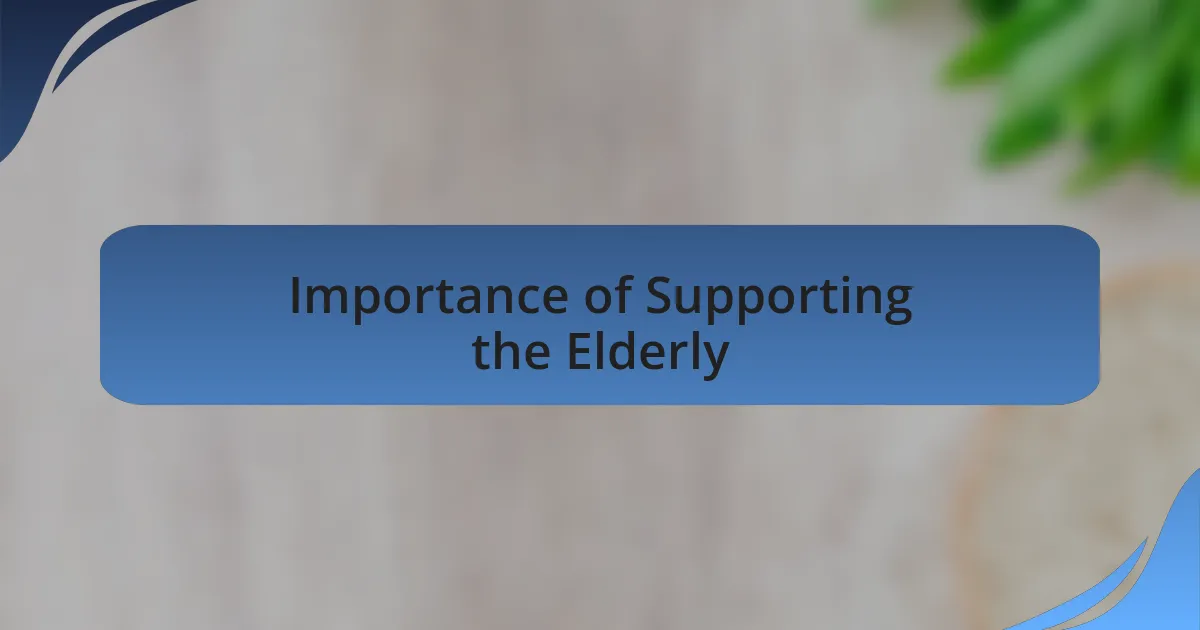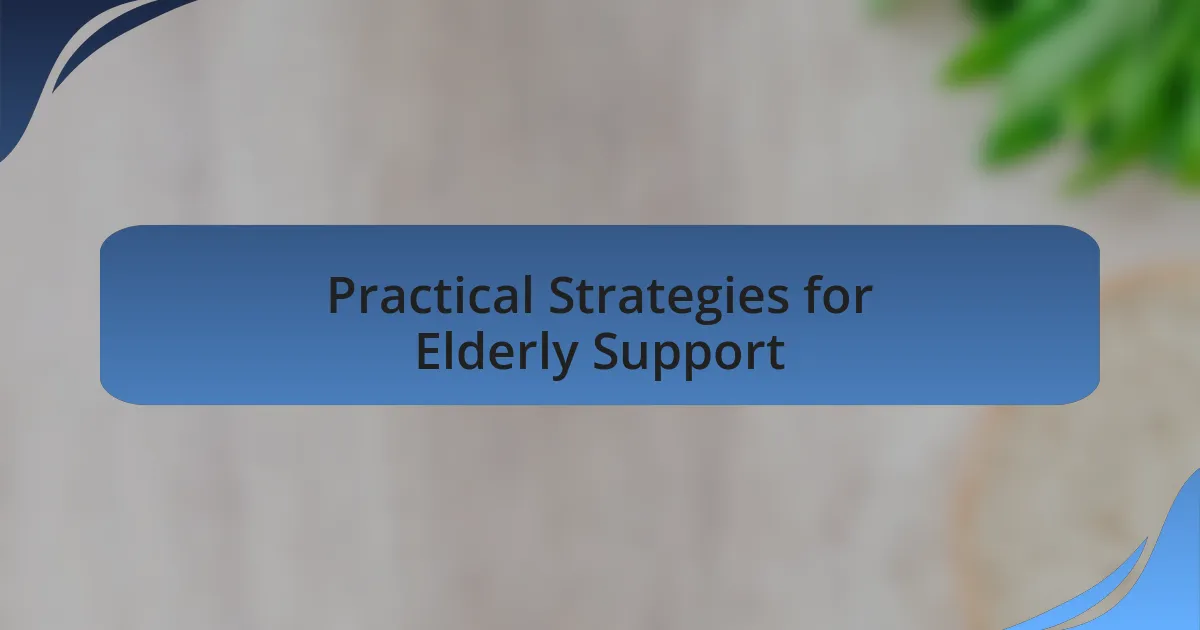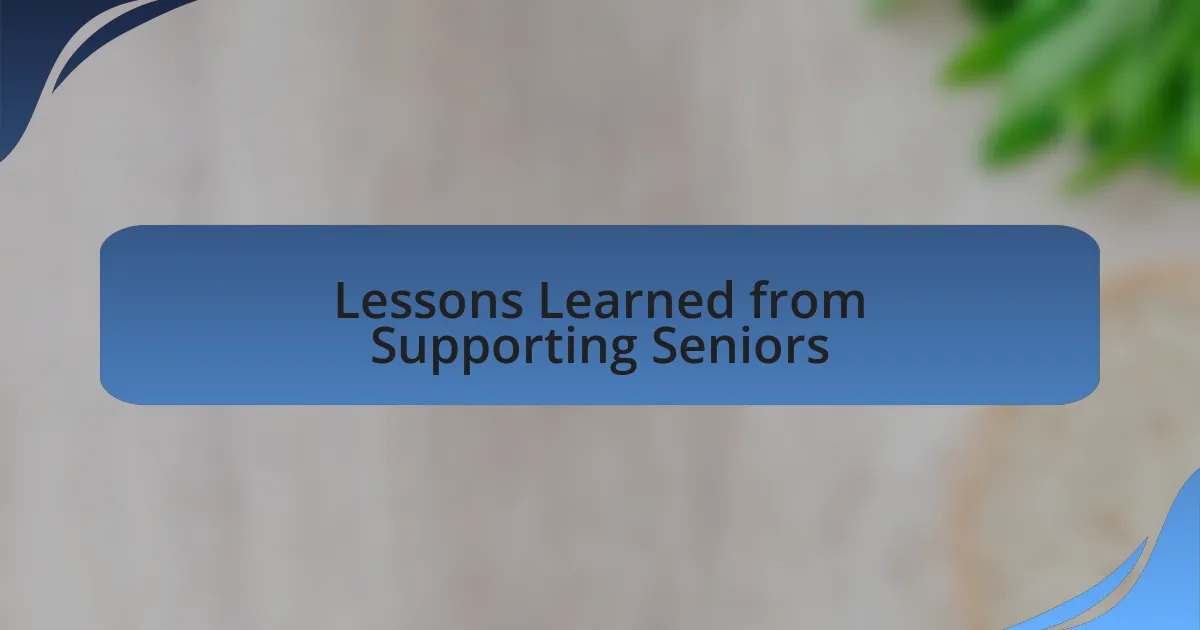Key takeaways:
- Covid wellbeing encompasses emotional and mental health, highlighting the importance of connection and community during isolation.
- Supporting the elderly involves recognizing their loneliness and providing companionship, as well as understanding their healthcare and technological challenges.
- Practical strategies include creating support networks, establishing routines, and encouraging physical activities tailored to seniors’ abilities.
- Personal experiences highlight the impact of small gestures, active listening, and adaptability in fostering connections and enhancing seniors’ wellbeing.

Understanding Covid Wellbeing
Covid wellbeing goes beyond just physical health; it encompasses emotional and mental wellbeing as well. When I first engaged with the elderly community during the pandemic, I saw firsthand how isolation affected their spirit. Have you ever noticed how a simple conversation can brighten someone’s day? I often found that sharing stories and checking in made a significant difference in their mood.
One particular instance stands out to me. A lovely woman named Margaret had not seen her family for weeks. When I brought her a small bouquet of flowers, her eyes lit up as she recounted the joy of her garden before Covid hit. It struck me how small gestures, like bringing a little cheer to their homes, contribute significantly to their overall wellbeing.
Understanding Covid wellbeing means recognizing the importance of connection and community. I often pondered how essential it is for us to reach out, especially to those who may feel forgotten. These experiences taught me that wellbeing is not just about avoiding illness; it’s about nurturing our relationships and providing support in times of uncertainty.

Importance of Supporting the Elderly
Supporting the elderly is vital for fostering a sense of community and belonging, especially during challenging times like the pandemic. When I started spending time with seniors, I quickly realized how loneliness can take a heavy toll. Just think about it: how often do we overlook the emotional needs of those who seem physically well? This emotional landscape is crucial, and offering companionship can truly lift their spirits.
One afternoon, while volunteering, I met Mr. Thompson, who shared stories of his remarkable life as a teacher. His eyes sparkled with memories, but I could sense a deep longing for connection that had been absent during lockdowns. These moments reminded me that by simply listening and engaging, we can validate their experiences and provide them with a renewed sense of purpose.
Moreover, the elderly hold a wealth of wisdom that can enrich our lives. I often find myself reflecting on how their perspectives can guide us through our own challenges. Isn’t it fascinating how much we can learn from them? By prioritizing their support and wellbeing, we create not just a safety net for them but a bridge that connects generations, fostering mutual growth.

Common Challenges Faced by Seniors
As I’ve navigated my journey in supporting seniors, one stark realization hit me: many elderly individuals struggle with mobility issues. For instance, I remember meeting Mrs. Hargrove, who expressed frustration about her limited ability to get around and attend social events. It struck me that something as simple as a few steps to the mailbox could feel like a mountain to climb, leaving her isolated and yearning for the activities she once loved.
Another significant challenge is accessing healthcare and information. During conversations with various seniors, I’ve seen confusion and anxiety regarding appointments or medication schedules. I once assisted Mr. Patel, who was bewildered by his medication’s side effects and could barely hear the doctor’s instructions. How often do we consider the complex maze of healthcare that can leave our elderly feeling powerless? Supporting them in understanding their health is an essential step in enhancing their overall wellbeing.
Additionally, technology can feel daunting for older adults. While helping a group of seniors learn to use smartphones, I noticed how overwhelmed they were by the constant updates and new applications. Remembering my own struggles with tech in the past, I empathized with their frustration when they couldn’t connect with family online. Isn’t it our responsibility to bridge this digital divide, so they too can enjoy the benefits of technology in staying connected and informed?

Practical Strategies for Elderly Support
To provide effective support for the elderly, I’ve found that creating a strong network of support is crucial. For example, I once coordinated a small neighborhood group dedicated to checking in on seniors regularly. This simple initiative not only provided companionship but also helped those who might otherwise feel invisible in our bustling community. Have you ever considered how a few friendly visits could drastically improve someone’s mood and sense of belonging?
Another strategy that has proven invaluable is integrating routine into their lives. I recall working with Mrs. Lo, who thrived on structure; establishing her daily schedule made a world of difference. We included time for her favorite activities, like gardening and reading, which sparked joy and kept her mentally engaged. Doesn’t it make sense that a predictable routine could instill comfort in times of uncertainty?
Lastly, advocating for physical activity tailored to their abilities has been a game changer. I encouraged Mr. Wilson to join a gentle yoga class designed specifically for seniors, and the transformation was remarkable. Not only did he gain strength and flexibility, but he also made new friends, transforming his once-sedentary lifestyle. How empowering it is to witness them rediscover vitality and connection!

My Personal Experiences During Covid
During the COVID-19 lockdown, my experiences in supporting the elderly were both challenging and deeply rewarding. I remember one rainy afternoon reaching out to Mrs. Green via a video call, her face lighting up as we shared stories from our past. It struck me how a simple conversation could bridge the isolation created by the pandemic, proving that human connection can transcend physical barriers. Have you ever considered how vital a familiar voice can be in comforting someone during difficult times?
There were moments that tested my resolve, particularly when I saw the escalation of anxiety among seniors. One evening, while delivering groceries to Mr. Martinez, he confided in me about his fears and loneliness. Listening to him share his worries ignited a desire within me to create a virtual support group. This initiative allowed seniors to connect, share their experiences, and remind each other that they weren’t alone in this struggle. Isn’t it fascinating how vulnerability can lead to collective strength?
As the lockdown stretched on, I also discovered the impact of small gestures. I started a weekly letter-writing campaign, encouraging friends and family to send notes to seniors in our community. One day, I received a heartfelt response from Mrs. Chan, who expressed how a simple letter filled with kind words had shattered her feelings of isolation. It made me realize that sometimes, the smallest acts of kindness can leave the most significant marks on our hearts. Would you agree that a few well-chosen words can be a powerful lifeline?

Lessons Learned from Supporting Seniors
Supporting seniors during the pandemic taught me the importance of patience and active listening. I recall an afternoon spent on the porch with Mrs. Thompson, who spoke slowly, recounting her life stories. I realized that allowing her the space to share at her own pace not only honored her experiences but also deepened our bond. Have you ever noticed how simply being present can empower someone to open up?
I also learned how crucial it is to be adaptable. One Sunday, I set up a virtual game night for a group of seniors but quickly found that not everyone was comfortable with technology. Instead of feeling frustrated, I adapted, providing personal one-on-one tutorials. This experience reinforced my belief that flexibility is key when trying to meet the varied needs of individuals. Have you considered how adjusting your approach can create inclusive opportunities for connection?
Lastly, I came to appreciate the power of shared laughter. One memorable moment happened when I decided to host a light-hearted storytelling session over video chat. The laughter that bubbled up from all corners of the screen was infectious. It reminded me that joy could exist even during tough times. Isn’t it remarkable how laughter can unify and uplift spirits, no matter the circumstances?